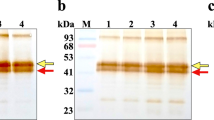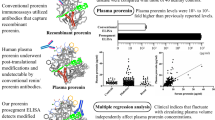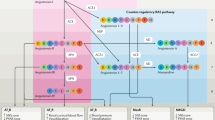Abstract
RENIN is said to split a leucyl–leucine bond in alpha 2 globulin substrate—angiotensinogen—to yield a decapeptide, angiotensin I. Angiotensin I is subsequently converted into an octapeptide, angiotensin II, by a converting enzyme contained in plasma. Angiotensin II has a pressor activity. We have studied the effects of synthetic peptides with a leucyl–leucine bond and their derivatives on the activity of renin in the formation of angiotensin. The peptides were di-, tri-, tetra- and pentapeptides with leucyl–leucine bonds at the C-terminal end, in the middle position, at the N-terminal end or with one of the other structures as shown in Table 1.
This is a preview of subscription content, access via your institution
Access options
Subscribe to this journal
Receive 51 print issues and online access
$199.00 per year
only $3.90 per issue
Buy this article
- Purchase on Springer Link
- Instant access to full article PDF
Prices may be subject to local taxes which are calculated during checkout
Similar content being viewed by others
References
Haas, E., Lamfrom, H., and Goldblatt, H., Arch. Biochem. Biophys., 48, 256 (1954).
Author information
Authors and Affiliations
Rights and permissions
About this article
Cite this article
KOKUBU, T., UEDA, E., FUJIMOTO, S. et al. Peptide Inhibitors of the Renin–Angiotensin System. Nature 217, 456–457 (1968). https://doi.org/10.1038/217456a0
Received:
Revised:
Published:
Issue Date:
DOI: https://doi.org/10.1038/217456a0
This article is cited by
-
Potent new inhibitors of human renin
Nature (1982)
Comments
By submitting a comment you agree to abide by our Terms and Community Guidelines. If you find something abusive or that does not comply with our terms or guidelines please flag it as inappropriate.



